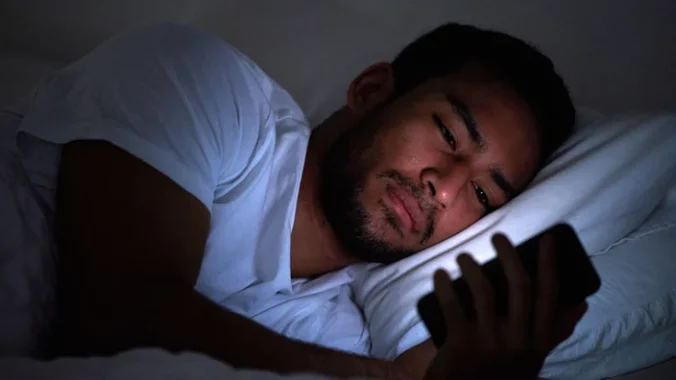Do you ever feel like it’s hard to get a good night of sleep? If so, you’re not alone. According to the CDC, about 1 in 7 adults have trouble falling asleep most of the time.
After all, there are a lot of different things that can get in the way of a good night of sleep. Sleep disorders, like insomnia and restless legs syndrome, often keep people awake. Your mental and physical health — as well as what medications you take — can also play a pretty big role. And your lifestyle choices, stress level, and even what you eat and drink can all affect your sleep, too.
Not being able to sleep well can really take a toll on your mind and body. So, let’s take a look at the top 12 reasons you might be struggling to sleep well. Knowing why can help you take action and hopefully get more rest at night.
1. Napping
Naps are popular for people of all ages. According to the National Sleep Foundation, about 1 in 3 adults in the U.S. take a daily nap. And though naps can help you feel more alert and rested, napping too long can actually make it harder to fall asleep at night.
If you like to nap, consider limiting yourself to a “power nap” of about 20 minutes. This gives your body long enough to rest, but not enough time to go into the deepest stages of sleep (the N3 stage of non-REM sleep). This means you wake feeling refreshed, rather than groggy. A 20-minute nap is also short enough that it won’t interfere with your nightly sleep.
2. Jet lag
When you travel to a new time zone, it can be hard for your internal body clock to adjust. This can cause a temporary sleep disorder called jet lag. Jet lag leaves you feeling sleepy and unwell during the day — and makes it hard to sleep at night. It usually goes away on its own in a few days after your body adjusts.
3. Anxiety
Anxiety can affect your sleep in two ways. First, anxiety (and many anxiety disorders) can directly interfere with your sleep. And second, when you don’t sleep well, you may actually feel even more anxious the following day. Many people also feel worried and anxious about getting to sleep that night, creating a cycle of anxiety and sleep problems.
4. Stress
Just like anxiety, stress isn’t good for sleep. According to Dr. Sarah Silverman, holistic sleep expert and SleepFoundation.org contributor, stress can cause a physical response in your body that makes it hard to sleep.
Dr. Silverman explains that “increased stress can activate what’s called ‘hyperarousal.’” Your nervous system turns on, and it feels like the “classic ‘fight-or-flight’ response.” This can put your mind and body on “high alert” at bedtime, and make it hard to fall asleep quickly.
5. Depression
Depression can cause sleep problems, too. People with depression can have problems falling asleep and staying asleep. Depression can also make you feel tired and “heavy” during the daytime, or make you wake up earlier in the morning than you’d like.
6. Caffeine
Caffeine is a molecule that makes you feel more alert. This can be helpful during the day, when you’d like to be awake. But if you have caffeine too close to bedtime, it can make it hard to sleep. Experts recommend avoiding caffeine for 4 to 6 hours before bedtime, especially if you’ve noticed that it affects your sleep.
7. Alcohol
Though alcohol can make you feel drowsy, it’s actually not good for your sleep, even in small amounts. This is because alcohol interrupts your normal sleep patterns, especially in the second half of the night as your body breaks down the alcohol.
When you drink alcohol before bedtime, it makes you wake up a lot and decreases the quality of your sleep. Alcohol can also make sleep apnea symptoms worse.
8. Screen time
No matter whether it’s your television, cell phone, or computer, staring at a screen before bed can make it hard to fall asleep. This is because screens emit a frequency of light (blue light) that sends a wake-up signal to your brain.
Going on social media, replying to email, or reading/watching the news right before bed can also cause digital overload, which can also make it hard to get to sleep.
9. Medication
Many common medications can cause sleep problems, too. These include prescription medications used to treat depression, anxiety, and ADHD. Steroids, beta blockers, and thyroid medication are also known to interfere with sleep. And some over-the-counter medications (like decongestants) can also cause insomnia.
10. Eating before bed
There’s some evidence that eating in the hour before bedtime can interfere with your sleep. This may be especially true if you eat a large amount of food, or consume spicy foods. If you do get hungry in the evening before bedtime, a small, simple snack may be the best choice, like a small portion of oatmeal or yogurt, or a piece of fruit.
11. Sleep disorders
In addition to insomnia and jet lag, there are many other sleep disorders that can interrupt your sleep (more on these below). Common examples are sleep apnea and restless legs syndrome. These conditions can cause problems with your normal sleep patterns and make it hard for you to rest at night.
12. Lack of movement in your day
If you spend most of your day sitting or lying down, it can be hard on your health. This type of inactive lifestyle is linked to health problems like stroke, high blood pressure, and high cholesterol, among others. It can also increase your risk for insomnia and other sleep problems.
